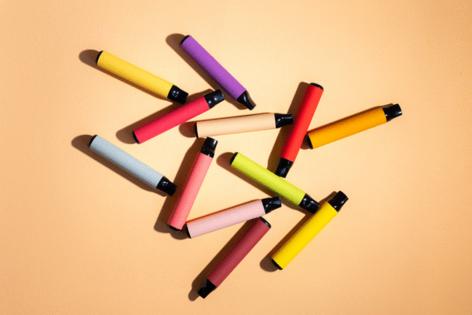Supreme Court sounds ready to back FDA's e-cigarette rejection
Published in News & Features
WASHINGTON — The Supreme Court appeared ready Monday to side with the Biden administration’s decision to keep certain flavored e-cigarettes off the market, as the justices explored the Food and Drug Administration’s approval process.
In oral arguments in FDA v. Wages and White Lion Investments, the Biden administration asked the justices to overturn a lower-court ruling that it said undermined decisions that have kept more than 1 million candy, fruit and other flavored e-cigarette products off the market nationwide.
The two companies that challenged the FDA decisions in this case, Triton Distribution and Vapetasia, sought approvals for flavors such as “Jimmy The Juice Man Peachy Strawberry,” “Iced Pineapple Express” and “Killer Kustard Blueberry.”
While the companies argued that the flavors could help adult smokers switch from normal cigarettes to e-cigarettes, the FDA found that the companies had not sufficiently backed up their claims in the face of the risks of increased youth smoking from the flavors.
The U.S. Court of Appeals for the 5th Circuit ruled that the FDA violated federal administrative law by misleading the companies about the scientific standards used for evaluation and rejecting their applications without even considering marketing efforts to discourage youth smoking.
Several justices questioned Monday whether the agency had given fair notice to applicants about how high its scientific standards were, but others on the court pointed out that the agency spent years warning about concerns it had over flavored e-cigarettes.
Justice Brett M. Kavanaugh pushed the attorney representing the vaping companies, Eric Heyer, to justify their challenge to the process. Kavanaugh said the 2009 law at the center of the case requires the agency to weigh scientific evidence about possible public health benefits to smokers moving from traditional cigarettes to vapes against harms such as increased youth smoking.
“But if the agency says, ‘That doesn’t outweigh the harm to youth, we’ve reviewed everything. We’re aware of everything,’ of course, they’re aware of everything that’s out there. It’s kind of the end of it, isn’t it?” Kavanaugh said.
Kavanaugh said the vaping companies disagree with the statute giving that much discretion to FDA and disagree with the FDA decision, “but I’m trying to figure out what the legal error is there.”
Heyer argued that the agency changed its position on the applications. Prior to the deadline, the agency didn’t include any specifics on what scientific evidence would be required and put a heavy emphasis on how companies would market their products without appealing to minors.
However, in rejecting the applications of his clients’ products and others, the agency said they didn’t provide rigorous scientific evidence and rejected them without even examining the marketing plans, Heyer told the justices.
Heyer argued that the agency’s actions would effectively shutter his clients’ businesses, which have been allowed to operate while the court case goes on. Heyer also pointed out that the incoming administration of President-elect Donald Trump could reverse the position of the FDA, and sending the decision back to the agency could allow for approval.
Kavanaugh responded that there was nothing stopping the companies from reapplying. Kavanaugh also said the agency was under no obligation to provide any guidance to applicants at all.
Chief Justice John G. Roberts Jr. and Justices Neil M. Gorsuch and Amy Coney Barrett also asked questions that seemed to suggest the FDA made a “harmless error” in denying the applications without looking at the companies’ marketing plans, since FDA officials had already determined they didn’t meet the scientific bar to bring the products to market.
Gorsuch said the “marketing plans go to the statute’s second requirement. There are two requirements. One, it helps smoking cessation. And two, it doesn’t create other problems. And two is kind of irrelevant if you fail under one.”
Under the Tobacco Control Act, the FDA must approve new tobacco or nicotine products. Since 2020, the agency has rejected applications from hundreds of companies for more than 1 million different vaping products.
Curtis E. Gannon, deputy solicitor general, argued that the law at issue and the agency’s process made clear that companies had to provide scientific evidence to justify their products, which are illegal unless approved.
“Common sense tells us that a flavor like ‘Mother’s Milk and Cookies’ is going to be disproportionately attractive to children. And respondents knew that they needed to make this comparison. They tried to show that flavors had an offsetting benefit with adults in their applications, and the FDA reasonably concluded that they didn’t have sufficient evidence to establish that proposition,” Gannon said.
Gannon pointed out that the agency has approved applications that provided scientific evidence like controlled trials and longitudinal studies.
Justice Clarence Thomas and other conservatives on the bench questioned whether the FDA had made approvals “a moving target” throughout the process.
At one point, Gannon said the administration would be fine with sending the case back down to the 5th Circuit to reevaluate it or to the agency to reevaluate only the marketing plans.
_____
©2024 CQ-Roll Call, Inc., All Rights Reserved. Visit cqrollcall.com. Distributed by Tribune Content Agency, LLC.







Comments